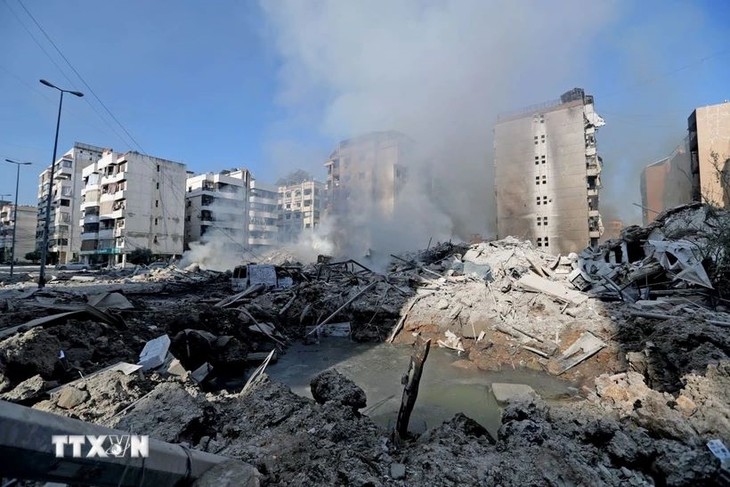(VOVWORLD) - US President Joe Biden and French President Emmanuel Macron on Tuesday jointly announced that Israel and Hezbollah have agreed to a US-brokered ceasefire. This diplomatic breakthrough offers renewed hope for peace and stability in the Middle East.
 The scene of destruction after Israeli airstrikes on Khiam, Lebanon. (Illustration photo: VNA) The scene of destruction after Israeli airstrikes on Khiam, Lebanon. (Illustration photo: VNA) |
In a White House statement, President Biden revealed that the proposal, mediated by France, was accepted following separate discussions with Israeli Prime Minister Benjamin Netanyahu and Lebanese interim Prime Minister Najib Mikati.
Breaking the cycle of violence
The ceasefire, effective at 4:00 a.m. on Wednesday in Lebanon, outlines a roadmap to de-escalation. Under the agreement, the Israeli army will withdraw completely from southern Lebanon and Hezbollah will relocate its heavy weaponry to the northern bank of the Litani River, approximately 25 km from Israel’s northern border. During the transition period, the Lebanese army, alongside United Nations peacekeepers (UNIFIL), will take control of a buffer zone along the border.
Border disputes between Israel and Lebanon will be addressed after a 60-day withdrawal period for both parties. While the US will not deploy forces directly, President Biden confirmed that the US, in coordination with France and other allies, will provide essential support to ensure the agreement's successful implementation. The US President emphasized that the deal is designed to be a permanent cessation of hostilities.
Biden said: "We’re determined this conflict will not be just another cycle of violence. And so, the United States, with the full support of France and our other allies, has pledged to work with Israel and Lebanon to ensure that these arrangement is fully implemented — the agreement totally implemented."
The ceasefire arrives at a critical juncture for Israel, Hezbollah, and the Lebanese government. According to the Lebanese Health Authority, since tensions escalated in October last year and culminated in a major conflict this September, 3,800 Lebanese civilians have lost their lives, with nearly 1 million displaced.
Southern Lebanon and Beirut have suffered extensive infrastructure damage. Hezbollah has suffered heavy military losses, including the deaths of senior commanders and the destruction of key infrastructure. Meanwhile, more than 120 Israeli civilians and soldiers have been killed and the conflict’s expansion into Lebanon has drawn international criticism and added pressure amid ongoing humanitarian crises in Gaza.
What’s next for Gaza?
Analysts suggest that Israeli Prime Minister Benjamin Netanyahu’s decision to agree to a ceasefire with Hezbollah, despite domestic opposition, reflects mounting international pressure and a deteriorating diplomatic environment for Israel. The prolonged Gaza conflict, compounded by its spillover into Lebanon, has resulted in significant humanitarian crises, leaving Israel increasingly isolated on the global stage.
Jonathan Lord, Director of the Middle East Security Program at the Center for a New American Security (CNAS), notes that, while the Israeli military has achieved numerous tactical victories over the past year—crippling much of Hamas’s and Hezbollah’s military capabilities—these successes are overshadowed by growing diplomatic and reputational costs.
According to Jonathan Lord, "Israel is in an incredibly precarious situation strategically. Right now, they are seeing really diminishing return in their campaign and Gaza and any continued conflict there will continue present humanitarian disaster." He said continued conflict will isolate Israel, a factor that Israel needs to consider.
The question now is whether the ceasefire with Hezbollah can set a precedent for a similar resolution in Gaza, ultimately ending hostilities and facilitating the return of hostages. French President Emmanuel Macron emphasized this point in a November 26 statement, calling for prioritizing a ceasefire in Gaza.
Macron said that the agreement must pave the way for a long-awaited ceasefire in Gaza, in light of the unparalleled suffering of its people, It demonstrates political courage that can lead to peace and security for all in the Middle East.
While the Israel-Hezbollah ceasefire does not explicitly link to ending the Gaza conflict—despite Hezbollah's previous demands—experts suggest it signals concessions from both Hezbollah and its ally Hamas. This creates an opportunity for Israel to pursue a sustainable solution to alleviate the humanitarian crisis in Gaza and move toward broader peace.